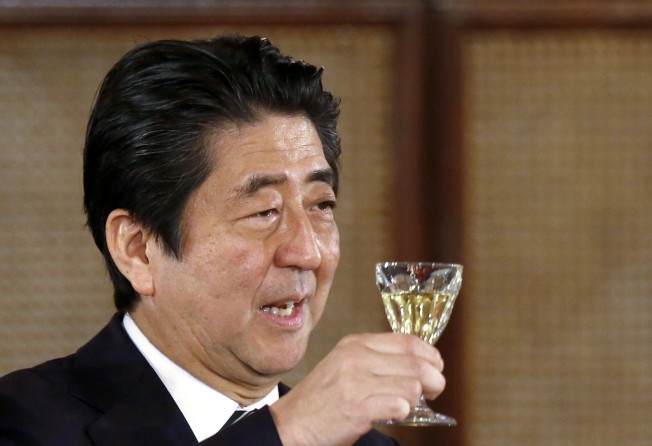Japan’s place at the top of the stock market may be fleeting

Abenomics just had a great week. That’s the spin from boosters as Tokyo reclaims the mantle of Asia’s stock-market leadership from China.
Japan never quite got over China surpassing its gross domestic product in 2011. China overtaking Japan’s stock market capitalisation in 2014 was yet another blow – one that, at least superficially, has been rectified. By week’s end, Japanese equities were worth US$6.17 trillion to China’s US$6.09 trillion, according to Bloomberg data.
Yet Prime Minister Shinzo Abe should leave the champagne cork in the bottle.
This reversion to the mean, if you will, has more to do with China than anything afoot in Japan. Bourses in Shanghai and Shenzhen are getting clobbered – Shanghai is down by more than 16 per cent this year – while the yuan fell more than 5 per cent versus the dollar. And while China is the direct target of Donald Trump’s trade war, Japan is fast becoming collateral damage.
At the same time, President Xi Jinping and the People’s of Bank of China are curbing financial excesses. The clampdown is reverberating through an economy facing headwinds from the West, hitting share prices.
Japan, in sharp contrast, is pumping oceans of liquidity into the economy. The central bank is cornering the market for exchange-traded funds.
If anything, Japan investors should be internalising the sudden burst of honesty from the Bank of Japan. Prior to a July 31 policy meeting, punters were betting on fireworks from Governor Haruhiko Kuroda. Possibilities included big changes to the BOJ’s bond-purchase programme or reducing its 75 per cent ownership of ETFs. Instead, Kuroda did nothing. He also pushed back the BOJ’s 2 per cent inflation indefinitely.
The BOJ tried to spin homeostasis with talk of flexibility and increased monitoring. But really, Kuroda effectively admitted the BOJ lacks potency to convincing defeat deflation. Intensifying headwinds racing Japan’s way from Washington will life even harder for the BOJ.
Trump’s steel and aluminium tariffs – 25 per cent and 10 per cent respectively – are a mere preview of what’s to come. His threatened 25 per cent levy on car imports would slam Japan. His threat of taxes on as much as US$505 billion worth of Chinese goods will reduce Japan Inc.’s willingness to fatten paychecks.
Tokyo fell into an old trap: believing surging equities would kick off a virtuous cycle that enriches the masses. Tokyo forgot that trickle-down economics didn’t work any better in the 1980s than it would in Trump’s America. By making Abenomics heavy on central-bank liquidity and light on structural change, Abe is mostly enriching the 1 per cent.
Abe’s biggest reform since December 2012 is tighter corporate governance. A United Kingdom-style stewardship code markedly increased returns on equity and fuelled a 13 per cent Nikkei rally over the last 12 months.
What it hasn’t done is notably boost average wages, increase innovation or enhance productivity. Japan is still sliding on global gender-empowerment tables. A long-promised start-up boom has yet to materialise.
Japan needs to be more about trickle-up economics. Its model has long factored giant exporters, making policy priorities more about job protection from the top down.
The promise of Abenomics was to level the playing field and refocus the incentive structure on smaller, scrappier enterprises.
Now though, Tokyo officialdom has a new threat with which to contend: the Trump administration. In its zeal to destabilise China, Team Trump is scuttling the best chance Japan had at a true revival in decades.
So go ahead, take a moment to celebrate the fact that Japanese stocks are again showing China who’s boss.
Just don’t forget that shares in Japan are just as likely to get trumped by global events as anywhere.
William Pesek is a Tokyo-based journalist and author. He has written for Bloomberg and Barron’s